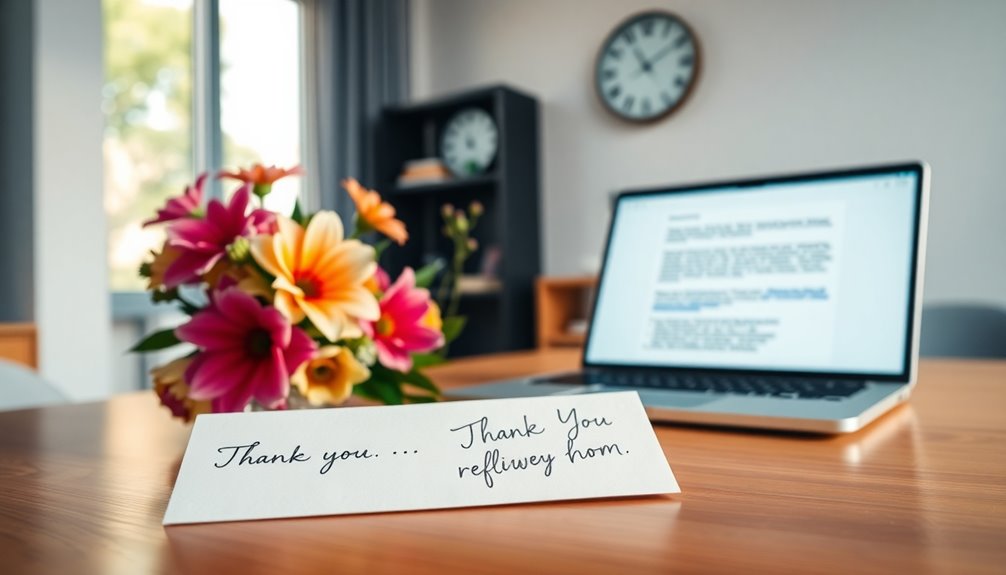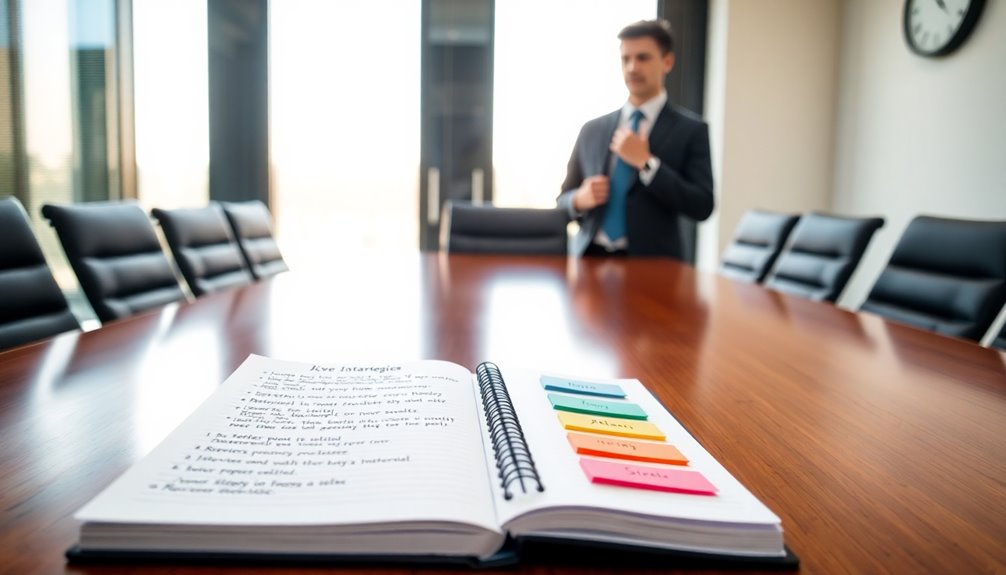After your interview, two key moves can help lock in your offer. First, send a personalized follow-up email within 24 hours. Express your gratitude, reference specific topics discussed, and reiterate your interest in the role. This shows professionalism and engagement, and 70% of employers appreciate this gesture. Second, maintain ongoing engagement with the company. Connect with your interviewers on LinkedIn and interact with their social media posts. This keeps you visible and reinforces your enthusiasm for the position. By following these steps, you'll strengthen your chances of landing the job—there's more to discover about these strategies!
Key Takeaways
- Send a personalized follow-up email within 24 hours to express gratitude and reiterate your interest in the position.
- Reference specific topics discussed during the interview to demonstrate engagement and attention to detail.
- Highlight any relevant skills or experiences that align with the role to reinforce your suitability.
- Connect with the interviewer on professional networks like LinkedIn to maintain visibility and strengthen your professional relationship.
- Stay informed about recent company developments to personalize future communications and show your ongoing interest.
Importance of Timely Follow-Up

Timely follow-up after an interview is vital for leaving a positive impression. Sending a follow-up email within 24 hours shows professionalism and keeps you top of mind for employers, as 70% appreciate a follow-up message. It's a great way to reiterate your interest in the position and the company, showcasing relevant skills or experiences that align with what you discussed during the job interview.
However, it's important to take into account the hiring manager's timeline information when planning your message. Following up too soon can come across as pushy, which you definitely want to avoid. Instead, aim for a balanced approach that reflects your enthusiasm without seeming desperate.
Make sure your follow-up consists of personalized messages that reference specific points from your interview; this not only enhances your candidacy but also demonstrates your attentiveness. Additionally, consider that positive reinforcement techniques can be useful in other areas of communication, including professional interactions. Finally, verify your follow-up email is free of grammatical errors and typos. These details matter, as they reflect your attention to detail and professionalism. A polished follow-up can reinforce your suitability for the role and keep you in the running for that offer you're aiming for!
Crafting a Personalized Message

Following up effectively sets the stage for crafting a personalized message that resonates with the interviewer. Start by expressing gratitude for their time and insights during the interview. Acknowledge how their perspectives deepened your enthusiasm for the job and the company. You want them to know you genuinely appreciate their effort in sharing valuable information.
Next, reference specific topics discussed during the interview. This not only shows your engagement but also reinforces your understanding of the role. Mention relevant skills or experiences that align with what was highlighted in your conversation. This connection reinforces your suitability for the position and keeps you top of mind during the hiring process.
Keep your follow-up message concise and professional. Avoid any grammatical errors or typos, as these can detract from your attention to detail, which employers value. Aim to send your message within 24 hours of the interview to maximize its impact. This timely gesture demonstrates your keenness and professionalism. By crafting a thoughtful, personalized follow-up message, you position yourself as a strong candidate who's truly invested in the opportunity. Additionally, consider how your financial management skills can be an asset to the company's growth and stability.
Effective Communication Methods

Effective communication methods play an essential role in your post-interview strategy. Start by sending a follow-up email within 24 hours. You should know that 70% of employers appreciate this gesture, as it shows professionalism and your continued interest in the job offer. Personalize your message by referencing specific points discussed during the interview; this enhances its impact and demonstrates genuine engagement.
When you communicate, keep your message clear and concise. This guarantees that your expression of gratitude and enthusiasm for the role is easily understood by the HR person. Additionally, monitor any follow-up instructions given during the interview. Aligning your timing and method with the company's expectations can make a significant difference.
Don't forget to utilize professional networks like LinkedIn. Connecting with interviewers there can reinforce your enthusiasm without coming off as overly pushy. Remember, effective communication is key to locking in your offer. By following these career advice tips, you'll increase your chances of moving forward in the hiring process while also setting the stage for future interactions.
Building Professional Relationships

Building professional relationships during the interview process can give you a significant edge in your job search. Engaging in effective follow-up communication not only expresses gratitude but also reiterates your interest in the position. Research shows that 70% of employers appreciate candidates who take the time to connect after an interview. Utilize platforms like LinkedIn to maintain visibility and demonstrate your commitment to networking within the industry.
During the interview, offer valuable insights or connections related to the company. This positions you as a resourceful candidate, enhancing your professional rapport with the hiring team. After the interview, send personalized messages that reference specific topics discussed. This creates a lasting impression and solidifies your professional relationships.
Don't underestimate the power of regular engagement with the company's content on social media. This ongoing interaction fosters a positive impression and keeps you top of mind for future opportunities, even if the immediate offer doesn't materialize. By focusing on building professional relationships, you're setting yourself up for success in your job search and beyond. Additionally, engaging in music therapy for autism can enhance your communication skills, which may also be beneficial in professional settings.
Staying Engaged and Informed

After your interview, staying engaged and informed is essential for keeping your candidacy alive. You'll want to make sure you follow up with a call or email within 24 hours. This shows professionalism and genuine interest in the position. Remember, 70% of employers appreciate such outreach.
Engaging in research about the company's recent developments can provide insights for your follow-up communication. This not only enhances personalization but also demonstrates your enthusiasm. Additionally, maintain connections with your interviewers through professional networks like LinkedIn, which can keep you top of mind for future opportunities.
Here's a quick reference to help you stay on track:
| Action Item | Purpose |
|---|---|
| Send a follow-up email | Shows interest and professionalism |
| Research company developments | Provides talking points for follow-up |
| Engage on social media | Reinforces visibility and interest |
Frequently Asked Questions
What Interviewers Say That Lets You Know You Won't Get an Offer?
If interviewers mention they're still considering other candidates or highlight a "strong pool of applicants," it's a red flag. If they talk about needing to consult higher-ups or if there's a lack of urgency, it's not a good sign. When their focus shifts to your challenges rather than strengths, or they don't ask about your availability or salary, you can sense their hesitation. Trust your instincts; these clues often signal you won't get an offer.
How to Manage a Job Offer When You Are Still Interviewing?
Did you know that 70% of job seekers continue interviewing after receiving an offer? To manage a job offer while still interviewing, keep communication open with potential employers. Let them know about your situation, as this can create urgency. Evaluate the offer carefully, and don't hesitate to negotiate based on other interviews. Finally, always express gratitude, maintaining professionalism, as it can lead to better opportunities in the future.
What Happens Between Final Interview and Offer?
After your final interview, the hiring manager reviews all candidates, which can take up to three weeks. During this time, you might hear from recruiters confirming your interest and salary expectations. If you're a strong contender, expect regular updates that suggest you're in the running. Companies may also ask about other offers to gauge your urgency, while direct communication from the hiring manager is usually a good sign for your candidacy.
How Do You Know if a Hiring Manager Wants You After an Interview?
You can tell a hiring manager wants you after an interview by their direct communication about next steps. If they reach out with follow-up questions or provide regular updates, it's a good sign. Positive feedback, like compliments on your fit for the role, also indicates strong interest. When they discuss salary expectations or express urgency about filling the position, you can feel confident that you're a top contender for the job.
Conclusion
To sum up, following up after an interview isn't just a courtesy; it's a strategic move that can greatly influence your chances of securing an offer. Research shows that candidates who send personalized thank-you notes are perceived as more engaged and professional. By crafting thoughtful messages and staying connected, you're not only reinforcing your interest but also building a lasting professional relationship. So, take these steps seriously—your future job might depend on it!
Felicity, our Author, pens in-depth articles and guides that delve into the heart of personal discovery. Her narrative-driven approach weaves together theory, practice, and personal anecdotes, making the journey of self-exploration both relatable and inspiring. Felicity’s contributions help illuminate the path for those seeking a deeper understanding of themselves and their relationships.










